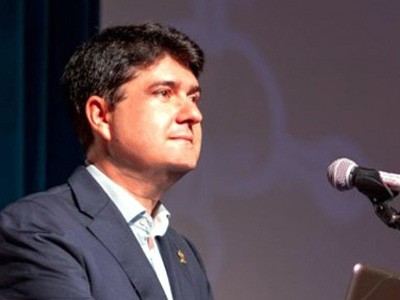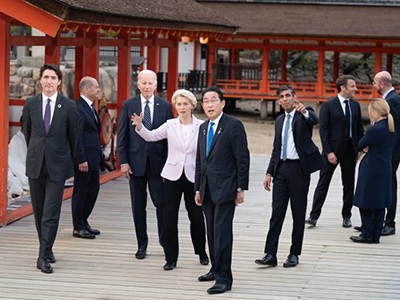
The extreme bonding between football fans can lead to trouble, but it can also be harnessed for positives, such as fans coming together to help their communities and standing up against racism.Credit: Adam Fradgley/Getty
Since we became funded research fellows in 2020, we’ve felt pressure to demonstrate our worth to funders — and ultimately to the taxpayer — by demonstrating the impact of our research. Fortunately, our work is practical and largely relevant to government interests in the United Kingdom, where we are based. M.N. investigates how the social bonds forged through sport can be used for social good, working with police units and the prison service, both in the United Kingdom and in mainland Europe. S.W.’s research focuses on increasing the social value of the archaeological work that is often conducted during construction projects as part of the planning process, with an eye to influencing both local and national UK government departments.
Some researchers might feel that their research area is too obscure to have a direct impact on government policy, and could struggle to see how it can be applied. Others might find networking and attending events difficult. We all recognize the painful conference coffee break, but policy impact can depend on contacts. How do you handle situations that might feel uncomfortable to some? And how can you get invited to influential events at which researchers meet policymakers, industrial leaders and other users of research?
We’ve found that a particularly powerful way to influence policy and politics is to be in the right rooms at the right time. Often, this means reaching beyond academia and outside the normal conference circuit. For M.N., this has meant taking opportunities to attend events in person (when childcare allows). At two BBC studio interviews, for example, conversations with other invited guests who have policy backgrounds have led to long-term professional relationships.
On the basis of our experiences, we have distilled four key recommendations for effective engagement.
Emphasize the relevance of the research. In the past, M.N.’s research on football (soccer) fans was dismissed by some as looking at ‘just a game’. Now she takes more time to detail why it matters: the sport has millions of fans around the world; levels of stress are high on match days, which can have knock-on effects for fans’ well-being; but the intense bonding between supporters has the potential to be harnessed for social good. Since adopting that practice, M.N.’s research has featured in a United Nations report on the use of sport for preventing violent extremism, as well as in a report prepared for policymakers associated with the international prison-based football charity the Twinning Project. It has also been used by the UK Football Policing Unit, which advises police forces around the country on how to handle football events. Her work now reaches the people who can change policies — for example, by adjusting policing regulations at football matches — and could ultimately help to make society a better place for us all.
Science-policy advisers shape programmes that solve real-world problems
Value informal conversations. Some of us find networking painful, but doing it helps to build relationships. Informal conversations can allow you to provide advice or references and arrange follow-up meetings. This is how lots of meaningful networks are created, and how trust can grow. The older we get, the more we realize that, often, the most senior people in our network are our old friends or colleagues, who now have more-influential roles. Remaining part of such steadily expanding spheres of influence will naturally benefit your own career.
As an early-career scholar, S.W. vastly expanded her network by volunteering for committees or editorial boards (many of which have become easier to be involved with because they now operate online). Some of these committee members now work as part of a UK parliamentary group on archaeology. Others regularly lobby the UK government through different routes, such as professional institutes, cross-sectoral initiatives and umbrella bodies of common interest groups. Maintaining professional networks with past and present colleagues on platforms such as LinkedIn can also be helpful, alongside strengthening more=direct links, such as by attending research and seminar groups and keeping an eye on relevant online forums and discussion groups. S.W., for example, follows Historic England’s Knowledge Hub, and attends the Heritage Alliance’s Archaeology Special Interest Group meetings to keep up to date on the latest policy and advocacy news.
Revealed: the ten research papers that policy documents cite most
Be prepared for a low success rate. Just as we have in the peer-review process, the two of us have learnt to develop a thick skin when it comes to policy engagement. Good timing can help. For instance, M.N. tries to release football-related research during the off-season (in the United Kingdom, this is between May and August) when journalists are often looking for stories, so this approach amplifies the message to policymakers. Increase your chances of engagement by sending a lot of e-mails. Resilience can simply involve accepting that a high proportion of them will go unanswered, and sending more. The attitude researchers have towards funding applications and peer review needs to be applied to policy engagement.
Revealed: the ten research papers that policy documents cite most
Frame your expertise as revelatory, rather than accusatory. Few people like to be corrected, but they do like to be helped to improve, so it’s your job to fill gaps in knowledge while building relationships. It often takes years to formulate a policy using conventional approaches. S.W. has come across a persistent and potentially frustrating way of thinking, in which preserving and reburying archaeological remains is seen as the preferred means of enabling them to provide value to the wider public. That’s despite the opportunities offered for widening participation and support for the heritage sector by considering other possibilities, such as excavations with community involvement.By drawing on research about inclusive practice, and on emerging social-value legislation that requires rethinking how communities benefit from development, these situations can become collaborative rather than confrontational. We’ve watched people we want to influence turn away when we’ve seemed too focused on a single solution, particularly if those individuals are policymakers whose work we’ve disagreed with. Instead, we advise channelling your passion into creative ideas and conversation.
High-level impact takes a lot of effort, but this does not need to come at the expense of a good work–life balance. Academics have skills in research and planning. Blocking out a few hours each month for preparation — including checking possible policy engagements, reserving space in your diary for sending out invitations and e-mail approaches, and creating spreadsheets of events and people — will help you to build up a base of contacts from which to create impact.
Turning research into real-world action isn’t easy — but, with patience, some proactive mingling and a thick skin for unanswered e-mails, it is achievable.
This is an article from the Nature Careers Community, a place for Nature readers to share their professional experiences and advice. Guest posts are encouraged.
Competing Interests
The authors declare no competing interests.




